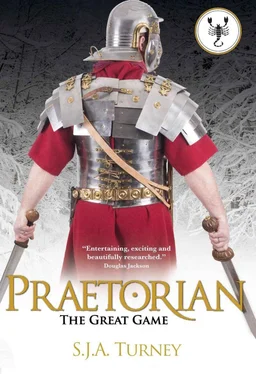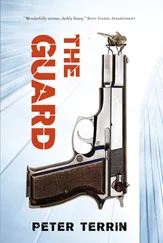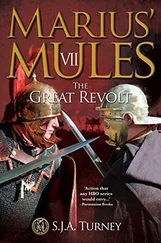S.J.A. Turney - The Great Game
Здесь есть возможность читать онлайн «S.J.A. Turney - The Great Game» весь текст электронной книги совершенно бесплатно (целиком полную версию без сокращений). В некоторых случаях можно слушать аудио, скачать через торрент в формате fb2 и присутствует краткое содержание. Год выпуска: 2015, Издательство: Mulcahy Books, Жанр: Исторические приключения, на английском языке. Описание произведения, (предисловие) а так же отзывы посетителей доступны на портале библиотеки ЛибКат.
- Название:The Great Game
- Автор:
- Издательство:Mulcahy Books
- Жанр:
- Год:2015
- ISBN:нет данных
- Рейтинг книги:4 / 5. Голосов: 1
-
Избранное:Добавить в избранное
- Отзывы:
-
Ваша оценка:
- 80
- 1
- 2
- 3
- 4
- 5
The Great Game: краткое содержание, описание и аннотация
Предлагаем к чтению аннотацию, описание, краткое содержание или предисловие (зависит от того, что написал сам автор книги «The Great Game»). Если вы не нашли необходимую информацию о книге — напишите в комментариях, мы постараемся отыскать её.
The Great Game — читать онлайн бесплатно полную книгу (весь текст) целиком
Ниже представлен текст книги, разбитый по страницам. Система сохранения места последней прочитанной страницы, позволяет с удобством читать онлайн бесплатно книгу «The Great Game», без необходимости каждый раз заново искать на чём Вы остановились. Поставьте закладку, и сможете в любой момент перейти на страницу, на которой закончили чтение.
Интервал:
Закладка:
The priests, with their sacrificial animals roped together, stood sombre and disapproving behind the cavorting easterners, a peculiar juxtaposition. Indeed, the oxen and bulls, goats and cages of birds flapped, stamped and shook nervously, an exotic parade of wildlife following on a little closely for the doomed creatures’ liking.
More carts lined up behind, the column already stretching around the corner of the mausoleum’s base and lining up across the grass toward the Tiber where it curved and looped back to the northwest. These carts bore the very same trophies of arms, armour and banners that had hung on the back wall of the dais when Rufinus had received his decorations in Vindobona.
And then came Rufinus.
A far cry from the glorious position of Mercator and his compatriots, surrounding the golden child of Rome, Rufinus and his seven sour-looking companions stood at attention, one eye on the spectacle, the other on the pathetic, dirty and degraded collection of mismatched Thracian, British and even Sarmatian slaves roped together, playing the part of the captured leaders.
He looked at the other seven guards. They were not all recent arrivals, though four clearly were. The other three were miserable, sour looking veterans who smelled of cheap wine in the sort of quantities that no amount of bathing this morning had been able to clear. Apparently those out of favour and awaiting hearings for disciplinary action were on a par with the new recruits, duty-wise.
At least it was an easy task. Even in the worst of circumstances, the slaves were unarmed and unarmoured, bound at the wrists and roped together both there and by the neck. In this particular case, though, there was an added incentive to behave. The prefect had made it clear, in some cases through a translator, that any man that played his part well this afternoon would be retained in an easy position in the palace, and the most outstanding would be granted his freedom.
Rufinus glanced over his shoulder at the main section of the procession. Behind the lictors, bearing their fasces, the emperor’s chariot sat awaiting its occupants, four magnificent black stallions champing at the bit. Behind the chariot and the officers and senior commanders, stretched the ranks of Praetorians, two cohorts of the urban guard, Speculatores, Frumentarii, Imperial Horseguard, and even the marines of the Misenum fleet that had arrived in the port of Ostia yesterday. It was a magnificent show of power, given the absence of even a single legion, let alone the ones that had actually been involved in the war.
There was the sound of a prolonged fart from among the ragged slaves roped behind Rufinus and he wrinkled his nose in disgust. They smelled bad enough when they weren’t flatulating!
Turning, he cast his eyes over the thirty four dejected slaves and the eight guards standing in two lines boxing them in. Amazingly, several of the captives gave him a defiant glare.
Gingerly, Rufinus reached up and probed the cheek below his left eye. Even a week after the punch-up, he was tender in so many places that every movement of his body, no matter how small, caused him to draw sharp breath as the pain writhed and lanced through him.
It had been a short brawl, really, that afternoon outside his new room.
Had it been an official match in the ring, there would have been jeers and catcalls at its brevity. After an initial blow that had taken him by surprise, Rufinus had quickly recovered and made the fight his own. Scopius had been careful in selecting his accomplices this time, though, and both men had been strong and fast.
Though short, it had also been a hard fight, and he’d heaved a sigh of relief as the first man folded up, his eyes rolling into his head and the imprint of the door jamb on his forehead. The second guard had fought with renewed vigour and had broken two of Rufinus’ ribs before he managed to smash the man’s head onto the flagged floor and drive the wits from him.
True to form, after the first blow, Scopius had stayed back and let his thugs take the brunt of the fighting. As the second man passed into unconsciousness, Rufinus had looked up, gripping his painful side, blood swimming in his eyes, his ear burning and leg wobbling, threatening to give way, only to see the back of the retreating Scopius as the man escaped the scene entirely unharmed.
Exhausted, Rufinus had collapsed and passed out, gratefully. When he came to, a jovial little guardsman with a slight Greek accent had been crouching over him, a look of concern on his face. His new room-mate, Icarion, had come back from his training session to find the three unconscious guards lying on the floor outside his room. He’d been wondering what to do about them when Mercator had arrived, having finished his tasks early, to fetch Rufinus to the bath, and the pair had brought him slowly and painfully around.
The guards’ medicus had given them an appropriately sceptical and despairing look as they explained how the wounded Rufinus had been thrown from his horse. The medic had raised an eyebrow as he lifted the tunic and examined the red and purple ribcage, and had asked ‘how many times?’
The man had shown little surprise when, while finishing off tending Rufinus and salving his wounds, two more guardsmen had been shown in, one of whom was still unconscious and being stretchered. The other had fixed Rufinus with a baleful glare.
Revenge would come soon enough, when Rufinus could think of how best to accomplish it. Where the bruised thugs were today, he didn’t know, but for certain they had better duties than he. Icarion – only the second Praetorian to appear on the list of men Rufinus actually trusted – was back near the chariot, alongside Mercator.
Clearly, despite the small number of free bunks, Rufinus had been lucky in his assignment – or more likely Mercator had contrived to provide him with the best possible situation. Icarion hailed from Thessalonica. The son of a wealthy silk importer, he had tired of the mercantile life within half a year and signed on to the Fourth Scythica Legion, posted to Zeugma, on the Parthian border. There, he had fought in the campaigns of Lucius Verus, the former husband of Lucilla, winning great renown and honour during the sack of Ctesiphon. Along with the torc and phalera he had received, he also carried a locket on a chain around his neck that contained a piece of the Parthian royal palace he’d carved off with his gladius.
Though small and reedy, Icarion had proved to possess a steely strength that few would expect, an iron will, and a speed that would make him a dangerous opponent. These powerful soldierly qualities, however, were wrapped up tight in a pleasant, engaging personality that displayed a genuine love of life. Icarion was infectious. Just being in the room with him improved a man’s mood.
But that was no help today, with the Greek out of sight back among those with the honour of protecting the emperor himself.
A shout went up from an officer somewhere to the rear and was echoed along the line by every centurion, decurion and optio, every soldier in the column snapping to attention. The noise was like the roaring of the sea.
A carriage rolled to a halt a few paces from the column and the door opened before the wheels were even stationary. Commodus took two steps down and then lightly dropped the last three feet to the turf and stretched.
His armour was almost laughable from a military point of view. The great, burnished, golden breastplate, embossed with a complex image of Hercules struggling with the Lernaean hydra, would hardly stop a sharp stick, let alone a sword. Still, the purpose of the armour was not to protect the emperor, but to impress the crowd, something it would do with gusto. The leather strips that hung in twin rows from shoulders and waist, were brilliant white, bordered with imperial purple and with fringes of the same colour. The emperor’s cloak was a deep Tyrian purple, embroidered in gold with designs of Hercules’ other eleven tasks. The cloak alone would cost five years’ wages for the average soldier.
Читать дальшеИнтервал:
Закладка:
Похожие книги на «The Great Game»
Представляем Вашему вниманию похожие книги на «The Great Game» списком для выбора. Мы отобрали схожую по названию и смыслу литературу в надежде предоставить читателям больше вариантов отыскать новые, интересные, ещё непрочитанные произведения.
Обсуждение, отзывы о книге «The Great Game» и просто собственные мнения читателей. Оставьте ваши комментарии, напишите, что Вы думаете о произведении, его смысле или главных героях. Укажите что конкретно понравилось, а что нет, и почему Вы так считаете.












